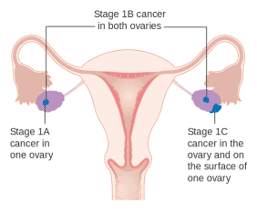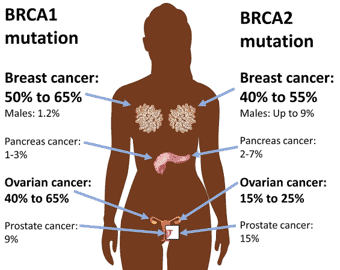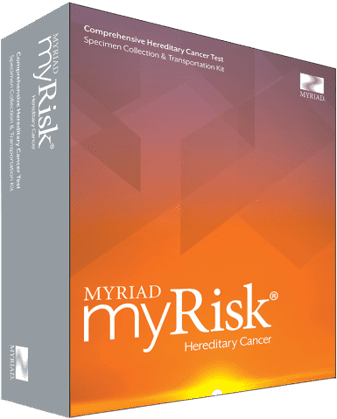Table of contents
What is Ovarian Cancer?
Ovarian cancer affects the ovaries, the reproductive organ that produces eggs in biological women. It is one of the most common cancers that affect women. The cancer arises from the rapid, uncontrolled growth of cells in the ovaries, usually beginning at the edges. Some studies have indicated that many of these cancers start in the fallopian tubes, the duct (tube) that carries eggs from the ovaries to the uterus. A person can be diagnosed with cancer at any age, although the cancer risk increases as a person gets older. Ovarian cancer genetic testing can help you assess your risks. Read more in our review!
There are different types of ovarian cancer, the most common of which are epithelial tumors. This is also the most aggressive form. Women suffering from epithelial tumors account for more than 80% of people with ovarian cancer. This type of cancer occurs in the epithelial cells which are at the lining of the ovaries and tends to spread to other organs.

Germ cell tumors are another type of ovarian cancer. A less common type making up less than 2% of cases, this cancer starts from the germ cells which go on to develop into eggs. Germ cell tumors have a high survival rate, with up to 90% of germ cell ovarian cancer treatments being successful.
Ovarian cancer can be difficult to detect as it often exhibits no symptoms. When observed, the symptoms are similar to those of other medical conditions. Symptoms include pain in the pelvis, bloating, trouble eating, and urinary symptoms.
If a person is suspected to have ovarian cancer, a doctor may assess if there is a history of ovarian cancer in the person’s family members. After that, a pelvic examination is carried out. A blood test or an imaging test can also be performed to establish the probability of ovarian cancer in the individual.
As the above-mentioned tests only establish a probability of ovarian cancer and do not confirm it, a biopsy needs to be performed if the results of the tests indicate ovarian cancer. A laparoscopy allows a surgeon to extract tissue samples of the ovaries to be examined. It involves the use of a camera attached to a thin fiber to examine the ovaries and take tissue samples for biopsy. Once a biopsy is conducted, it can be confirmed if the person has ovarian cancer or not.
Why Ovarian Cancer Genetic Testing
Genetics plays an important role in diagnosing ovarian cancer. According to the American Cancer Society, a person is more likely to develop ovarian cancer if one or more members of their family have the condition. This higher risk also increases with the number of relatives who have cancer, including those diagnosed with breast cancer.
Other types of cancer such as breast cancer and pancreatic cancer running in a family can increase the odds of a member of that family developing ovarian cancer. This is because there are some inherited mutated genes associated with a high risk. The presence of these genes in a family lineage is referred to as family cancer syndrome. More than a fourth of ovarian cancer patients come from a family with family cancer syndrome.
There are different kinds of family cancer syndrome that increase the chances of developing ovarian cancer. One of them is hereditary breast and ovarian cancer syndrome. This syndrome is as a result of mutations in the BRCA1 and BRCA2 genes. Anyone can inherit this mutation, but it is most common in those of Ashkenazi Jewish decent. The presence of genetic mutations in these genes increases the risk of developing various types of cancer including a risk of breast cancer, peritoneal cancer, and other types.

Another family inherited cancer syndrome is hereditary nonpolyposis colon cancer syndrome. Although this syndrome is more significant for the risk of colon cancer, it has been found that it also raises the risk of developing ovarian cancer significantly.
Up to 20% of women suffering from ovarian cancer have one or more mutated genes linked to the disease. This is why genetic testing and speaking with a genetic counselor is often recommended for those trying to check for ovarian cancer. When ovarian cancer is discovered early, treatment can be very successful.
Genetic Testing For Ovarian Cancer
Color genetic testing for ovarian cancer
Color seeks to make genetic testing for cancer available to the average consumer. Color provides tests for various diseases including COVID-19, heart diseases and cancer. Color provides tests for consumers that are detailed and also affordable.
Based on the knowledge that early detection of cancer leads to a higher chance of successful treatment, the Color test by Color examines thirty genes linked with the risk of cancer. The Color test can be ordered by the health care practitioner in charge of a woman’s treatment to further understand her risk and to tailor treatments specific to her condition.

The Color test kit costs only $249 as opposed to some other genetic tests that cost thousands of dollars.
Myriad Genetics genetic testing for ovarian cancer
Myriad genetics seeks to help both patients and physicians incorporate genetics into healthcare. The company has provided tests to millions of patients to assist in the diagnosis and treatment of various diseases. They have carried out various studies to uncover the relationship between genetics and common as well as rare diseases.
Myriad genetics offers a test for ovarian cancer called the Myriad MyRisk Hereditary Cancer test. This test is designed to help people who may be at risk for ovarian cancer, breast cancer, and other forms of cancer by providing them with the means to assess their risk and make informed decisions regarding diagnosis and treatment of their cancers.
The MyRisk Hereditary Cancer test brings various benefits to cancer patients. One is that it helps the patient discover the cancer when it is in its early, treatable stage. It also helps the physician streamline treatment for the patient which can result in an overall lower cost of treatment. The discovery of mutated hereditary genes in an individual will also alert other members of the family to the risk of cancer in their family.

The cost of the MyRisk Hereditary Cancer test can be up to $4,000 although the company claims that the cost is covered by most insurance companies and that the patient rarely has to pay more than $100 for the test.
Nebula Genomics
Nebula Genomics is a privacy-focused genetic testing company that provides whole-genome sequencing services to its customers. Nebula Genomics provides the most accurate genome sequencing service in the world through its test that decodes 100% of your DNA.
Nebula’s gene testing is also 100% anonymous and none of your test results can be leaked. You will receive weekly updates based on new research to keep you up to date on the latest advancements in genetic research. The results obtained from a whole-genome sequencing from Nebula are highly detailed. Although they are not diagnostic tests, they are of high quality and can be used by a physician to help assess the risk of diseases, ovarian cancer included.
Nebula offers gene testing kits in three tiers, a basic kit, a deep kit, and an ultra-deep kit. The kits cost $99, $299, and $999 respectively. If you have DNA results from another company, you can upload them to Nebula Genomics for free.
The basic kit majorly provides you with information about your ancestry and some insight into the most common diseases. The deep kit is recommended for most people as it provides you with information on your susceptibility to various rare diseases in addition to information on your ancestry. The ultra-deep kit provides you with an extremely accurate and detailed report of your DNA.
Whereas other genetic companies only decode 0.01% of your genome, a Nebula Genomics test makes use of 30x whole genome sequencing which makes it the most comprehensive gene sequencing test available.
If you liked this article, you should check out the other posts in the Genetic Cancer Testing series and explore the Nebula Research Library to learn about hundreds of other conditions influenced by genetics, including many cancers:
- Colon Cancer Genetic Testing
- Pancreatic Cancer Genetic Testing
- Genetic Testing for Breast Cancer
- Genetic Testing For Prostate Cancer
- Lung Cancer Genetic Testing
- Genetic Testing for Thyroid Cancer
Get your genome sequenced to receive personalized reports on all these conditions today!
Edited by: Christina Swords, PhD
October 19, 2021
